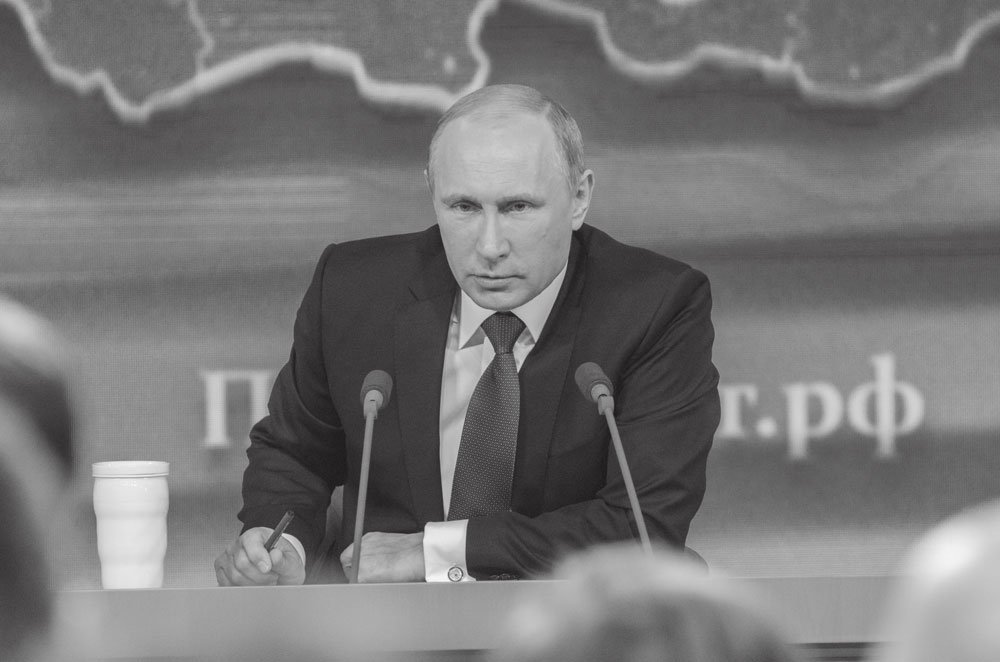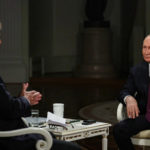By Iulia-Sabina Joja | Berlin
Russia’s foreign policy is President Vladimir Putin’s foreign policy. It’s a one- man show. This is partially due to the super-presidential system of the country. However, it is also a one-man show because Vladimir Putin himself, now in his fourth term, has a firm grip on his country and a strong vision for foreign policy. Hence, when endeavouring to scrutinise Russian foreign policy, we have to analyse Putin’s discourse and actions.
Strategic narratives are defined by Miskimmon et al. (2012 p. 3) as “means for political actors to construct a shared meaning of international politics to shape the behavior of domestic and international actors.” These narratives have a strong temporal dimension, and formulate a resolution or a projected outcome; they help construct connections between events. Furthermore, they are a highly effective tool of soft power. Szostek (2017 p. 572), writing on Russian strategic narratives, points out that they “allow state-led attacks on critical others and the self-promotion via ‘nation-branding’ to be seen as different but related to the same end.” At their most effective, strategic narratives can structure the identity of the actors and the experience of international affairs itself. The utility of strategic narratives is that they help to explain how “different actors project and contest narratives of the international system, which highlights how existing and emerging powers seek to impose a shared meaning of how the international order does, or should, function.” (Miskimmon & O’Laughlin 2017 p. 113)
During the 2012 election campaign in Russia, Vladimir Putin shifted his foreign policy discourse. While the first two terms and Medvedev’s presidency were marked by a discourse of ‘pragmatism’, Putin has gradually ideologised Russian foreign policy, a process which reached its peak with his speech on the annexation of Crimea in March 2014.
The shift from a pragmatic foreign policy to a profoundly ideologised one, marked by normativity, exceptionalism, messianism and spirituality, was triggered by the protests against Putin during the 2012 election campaign. In response, Putin constructed a complex strategic narrative of blaming the West, which targeted initially the domestic and later the international audience.
His strategic narrative is built on the foundation of national identity. The easiest way to construct narratives around national identities is to establish an oppositional relationship between ‘us’ and ‘the other’. Vladimir Putin created a national identity narrative focused on the West (with the United States as its leader). In this discourse, not only is the “West” crucialfor Russian national identity, but the Russian strategic narrative would simply not exist without it. The threads in Russia’s strategic narrative which emphasise rivalry with the West have a constitutive effect on Russian national identity (Szostek 2017 p. 579). By constructing his opponent as an identitarian threat, Vladimir Putin has securitised the West1. He points out the West’s shortcomings, falsely interpretsits intentions, and magnifies the erroneous consequences of its actions. Thus, the Kremlin constructs Russia’s image as a better alternative to ‘the West’ – a moralising, value-laden, spiritual and conservative power.
The invasion of Ukraine in 2014 is the event around which Putin has built his foreign policy narrative of juxtaposing the West with Russia. This narrative has served to justify his actions and to consolidate Russia’s revisionist role on the international stage. Moscow claims privileged rights in the countries of its former empire. An analogous situation would be if the United Kingdom, for instance, invaded and incorporated parts of Egypt or Somalia into the United Kingdom because these were former colonies.
Let us now turn to Moscow’s motivations as expressed in the country’s foreign policy narrative. Putin’s strategic narrative has complex and powerful implications for the way we understand foreign policy in the Western world.
The sub-narratives of Russian foreign policy discourse
01. Russia the moraliser
In the 2013 Foreign Policy Concept, Russia’s Ministry of Foreign Affairs insists 19 times on the importance of respecting international law. Moscow also strongly links the lack of respect for international law to the West. The Kremlin emphasises the rule of law on the international stage – typical of discourses such as those of the EU or Canada. However, the importance
of international law in itself constitutes a sub-narrative on the West’s contempt for international law. The juxtaposition of the West with Russia has perhaps the most serious implications for our collective acceptance of universal values. The Kremlin’s narrative directly entails the classical antagonism of good versus evil: by implying the West’s disrespect for universal values, Moscow constructs an image of itself as a moral authority. This self-image is further amplified by pointing fingers to the West; Russia becomes a moraliser that holds the West – the creator of universal values – accountable for its own hypocrisy. Thus, Putin’s narrative seeks to emphasise a collective belief in the West’s double standards.
The irony of Moscow’s ‘Western double standards’ consists in the Kremlin’s double talk itself. Russia uses international law to highlight the West’s misdeeds, and thus discursively transforms it into an immoral body. By showcasing the West’s double standards, Putin justifies his own brazen violations of international law, such as the disregard for territorial integrity and sovereignty in the case of Ukraine, and the sovereignty of Western states by meddling in elections. Putin stated in 2014 (Kremlin 2014b) that “the allegations and statements that Russia is trying to establish some sort of empire, encroaching on the sovereignty of its neighbours, are groundless.”
The Kremlin takes its narrative on morality a step further. In the 2014 Concept of Cultural Policy, Moscow asserts that the state ought to distinguish between good and evil, and
should ban cultural content that contradicts Russia’s established system of values. Tolerance and multiculturalism, the document states, are detrimental to Russian identity. The Russian narrative has serious implications; such an assertion of the state’s power and its capacity to distinguish between good and evil, and to claim the specificity of the ‘Russian value system’ (as opposed to the universal one), belongs to the realm of totalitarianism, just as reserving the right to ban cultural content that contradicts specific values belongs to the realm of Orwell’s fictional account of dictatorship in 1984.
The shift from a pragmatic foreign policy to a profoundly ideologised one, marked by normativity, exceptionalism, messianism and spirituality, was triggered by the protests against Putin during the 2012 election campaign.
Fascism constitutes an important element of Russia’s narrative on the West. Putin states that the West supports “a very dubious public ranging from open neo-fascists to Islamic radicals.” (Kremlin 2014b) Fascism is defined as “a political system based on a very powerful leader, state control, and being extremely proud of country and race, and in which political opposition is not allowed.” (Cambridge Dictionary n.d.) In tandem with the strategic narrative described above, this definition seems to apply politically and legally to the Russian state – in contrast to Putin’s projection of said Western ‘fascism’. Ideologically the West has, after the painful experience of WWII, become defined by anti- fascism. Timothy Snyder (2018) highlights the key role which the political ideas of fascist thinkers such as Ivan Ilyin play for Vladimir Putin. According to Ilyin, “Russia as a spiritual organism served not only all the Orthodox nations and not only all the nations of the Eurasian landmass, but all the nations of the world.” (Ilyin, cited in Snyder 2018). The collective will instead of individualism, a distinct spirituality, and messianic elements: these are pillars of fascist political thinking. These concepts have also served as rhetorical touchstones in Putin’s speeches legitimising the annexation of Crimea and Russian foreign policy in general.
‘Russia’s value system’ is juxtaposed in the Concept of Cultural Policy (2013) to the “European concepts of multiculturalism and tolerance” that Russia should “reject”. With this discriminatory narrative, Putin proclaims a “distinct spirituality” and “value system.” Thus, he sets a precedent for a self-proclaimed democracy to infringe on human rights and outlaw contrarian cultural content. Speaking to far- right voters worldwide, Putin’s strategic narrative is morally authoritative, though sophistic: he simultaneously condemns and upholds moral exceptionalism; he eviscerates and at the same time endorses universal values; he castigates and yet champions.
02. Russia the sovereign
Sovereignty is a major topic of the Russian strategic narrative as projected into foreign policy. As the very principle of the international system since the Peace of Westphalia in 1648, it is also, in international relations theory, a concept upheld by Realism, which instils a special legitimacy and rationality upon the concept. Without sovereignty, so the logic goes, there are no states, and thus no order in the international system.
Vladimir Putin has discussed and emphasised this concept. In his speech on the annexation of Crimea (Kremlin 2014a), the Russian president mentions the term four times, and in his speech to the Valdai club in 2014 (2014b), eight times, linking the concept to the very existence of the Russian identity and nation: “Either we remain a sovereign nation, or we dissolve without a trace and lose our identity.” At the same event a year earlier, he discursively connected sovereignty to Russianism: “This is because the desire for independence and sovereignty in spiritual, ideological and foreign policy spheres is an integral part of our national character.” (Kremlin 2013) Putin thus transforms sovereignty from a legal and political term into a spiritual and ideological concept (Makarychev & Yatsyk 2015 p. 144).
As the Russian identity becomes inseparable from the concept of sovereignty, it is also juxtaposed to the Western world. While Russia respects and is defined by its sovereignty – so the strategic narrative goes – the West opposes it. Russia is the backbone for sovereignty, while the West violates it by ‘invading’ countries. Putin accuses the West of double standards: “We see attempts to somehow revive a standardised model of a unipolar world and to blur the institutions of international law and national sovereignty. Such a unipolar, standardised world does not require sovereign states; it requires vassals.” (Kremlin 2013)
In Putin’s strategic narrative Russia becomes a principled power opposing the West’s hypocrisy. The Kremlin thus assumes a double role – both defender and victim.
In Putin’s strategic narrative Russia becomes a principled power opposing the West’s hypocrisy. The Kremlin thus assumes a double role – both defender and victim. Putin
discursively creates an emotional image of anxiety by emphasising persecution by the hegemon, a characteristic of dictators’ narratives. As Putin formulates it (Kremlin 2014a):
We have every reason to assume that the infamous policy of containment, led [by the forerunners of ‘the West’] in the 18th, 19th and 20th centuries, continues today.
They are constantly trying to sweep us into a corner because we have an independent position, because we maintain it and because we call things like they are and do not engage in hypocrisy.
Moscow’s role of ‘sovereignty bearer’ in the face of Western conspiracy dissolves into self-contradiction when it comes to the case of Ukraine’s sovereignty. Putin has rhetorically upheld Ukraine’s sovereignty: “I have never disputed that Ukraine is a modern, full-fledged, sovereign, European country.” (Kremlin 2014b) At the same time, highlighting the West’s hypocrisy legitimises Moscow’s great-power identity: because the Kremlin takes similar actions, and regardless of international protestations, it acts as a great power too. (Szostek 2017 p. 579)
03. Russia the conservative
With the shift from a pragmatic strategic narrative to one inculcated with normativity and values, Putin defined the Russian identity and the system of values it adheres to as something unique. In order to create an effective juxtaposition, he contrasts them to the Western values of multiculturalism and tolerance. Defending Russian values has been transformed into a narrative warfare against Western values:
A serious challenge to Russia’s identity is linked to events taking place in the world. Here there are both foreign policy and moral aspects. We can see how many of the Euro-Atlantic countries are actually rejecting their roots, including the Christian values that constitute the basis of Western civilisation. They are denying the moral principles and all traditional identities: national, cultural, religious and even sexual. They are implementing policies that equate large families with same- sex partnerships, belief in God with the belief in Satan. (Putin, cited in Zevelev 2018 p. 10)
By moving social and religious problems to the front of foreign policy, Putin expands his audience to world- wide conservatives.
First, the narrative renders the West as immoral, and thus unfit to lead the world. Second, it juxtaposes a narrative of ‘moral’ values (as opposed to immoral ones) and legitimises conservative values. Third, he creates a profoundly toxic narrative with nationalistic and fascist connotations, by driving social, cultural and biopolitical features into foreign policy. Lastly, through his narrative, he explicitly expands his audience, addressing not only the ‘Russian civilisation’, but worldwide adherents of conservatism.
Putin’s narrative of conservatism is focused on religious faith (Orthodoxy specifically and Christianity more broadly) and traditional social features. The myth of traditionalism he proposes is heavily ideologised and exudes nationalism. It excludes and discriminates those that are secular, tolerant, non-Caucasian, identify with a different civilisation or LGBTQ. With his strong emphasis on (a selective and, by default, subjective interpretation of) history, Putin upholds Russian civilisation and religion as values within foreign policy, as most prominently reflected in his 2014 speech on Crimea (Kremlin 2014a):
To understand the reason behind such a choice, it is enough to know the history of Crimea and what Russia and Crimea have always meant for each other. Everything in Crimea speaks of our shared history and pride. This is the location where Prince Vladimir was baptised. His spiritual feat of adopting Orthodoxy predetermined the overall basis of the culture, civilisation and human values that unite the peoples of Russia, Ukraine and Belarus.
By moving social and religious problems to the front of foreign policy, Putin expands his audience to worldwide conservatives. At the same time, he conflates problems of international law with social and religious issues. His foreign policy also speaks to nationalistic audiences that reverberate with ethnos, ‘cultural matrices’, ‘historical codes’ and genes, as highlighted by Foreign Minister Lavrov’s essay on the ideology of Russian foreign policy. Lavrov (2016) argues that the Russian people should “decide their own destiny despite the European West’s attempts to subjugate Russian lands and deprive them of their own identity.” He continues: “I am convinced that this wise and far-sighted policy is in our genes.” The Russian cultural ministry’s move to propose the ban of cultural content that does not conform to national values speaks to this conviction.
Conclusions
To make sense of Russian foreign policy we need to look at the strategic narrative. Strategic narratives help explain how powers seek to impose a shared meaning of how the international order does, or should, function. They also help us understand how discourse can structure identities and the experience of international affairs, and how state-led attacks on critical others and the self-promotion via ‘nation-branding’ can be part of the same effort.
Putin’s foreign policy narrative is profoundly ideologised, marked by normativity, exceptionalism, messianism and spirituality. His discourse is built around national identity and a juxtaposition of the West as ‘the other’. Putin’s strategic narrative encompasses contradictions between embraced (and universally accepted values) and policies. The Kremlin constructs its role as an enabler of specific, non-universal values, although in its discourse Moscow embodies universal values. Putin defines Russia as sovereign by default, blames the West for violating sovereignty, and upholds Ukraine’s sovereignty while invading it. In Russia’s foreign policy narrative, values are both specific and universal, both good and bad, both applicable and non-applicable.
Putin’s identitarian, profoundly ideologised narrative, securitises the West by presenting it as inherently immoral and threatening. Russia’s strategic narrative has complex and powerful implications for the way we understand foreign policy in the Western world.
__
IULIA-SABINA JOJA is visiting fellow at the Center for Military History and Social Science of the Bundeswehr, Potsdam University and teaches at the Bucharest University of Economic studies. An extended version of the article was elaborated within the project “Understanding the Eastern Neighborhood. A unique platform for comprehensive debates
and analysis on Russian affairs”, implemented by ESGA between February 2018 –January 2019.




